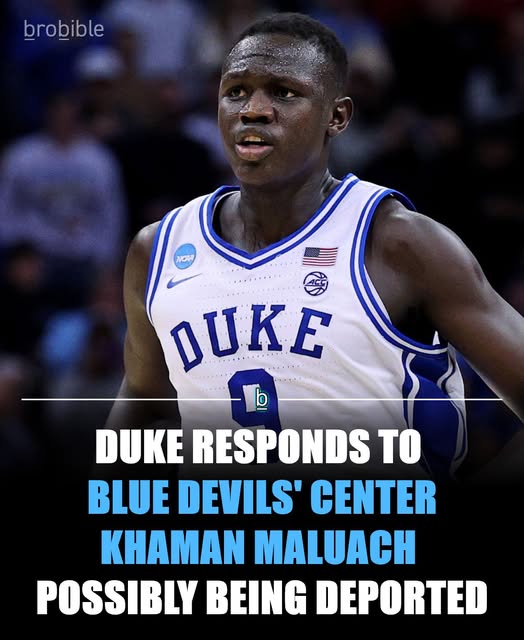Looming Regulation Threatens Future of South Sudanese Star Khaman Maluach
In a development that has sent shockwaves through the world of college basketball and beyond, 18-year-old South Sudanese phenom Khaman Maluach, a freshman already projected as a potential top-10 pick in the upcoming NBA Draft, faces an uncertain future in the United States. A new federal regulation aimed at tightening student visa compliance and athletic eligibility could, if passed and enforced, lead to his deportation — an outcome that would not only derail a promising career but also ignite a broader conversation about immigration, international student rights, and the intersection of athletics and policy.
For Maluach, whose journey from the worn courts of Africa to the bright lights of college basketball epitomizes the American dream, the possibility of being forced to leave is both heartbreaking and bewildering.
The Rise of a Star
Khaman Maluach’s story is one of remarkable ascent. Born in war-torn South Sudan, he discovered basketball relatively late compared to American prospects. Standing 7 feet 2 inches tall with an impressive wingspan, Maluach quickly became a standout at the NBA Academy Africa, where his raw athleticism, instincts, and burgeoning skill set turned heads.
By the time he was 17, Maluach had already represented South Sudan’s national team — an incredible feat for someone so young — and helped them qualify for the 2023 FIBA World Cup. His performances attracted a swarm of attention from college coaches, recruiters, and NBA scouts alike.
Ultimately, Maluach committed to play college basketball in the United States, choosing a program renowned for developing NBA talent. His arrival was celebrated, with many experts touting him as a future lottery pick and a potential franchise cornerstone at the professional level. His freshman season has been promising — flashes of brilliance, defensive dominance, and steady offensive growth.
But now, all of that is in jeopardy.
The Regulation in Question
The new regulation, introduced by the Department of Homeland Security (DHS), seeks to implement stricter standards for F-1 student visa holders who participate in revenue-generating college athletics. Under the proposed rule, athletes whose “primary purpose” in the U.S. appears to be athletic advancement rather than academic pursuit could face visa revocation and deportation.
While the regulation is ostensibly aimed at “ensuring the integrity of the student visa program,” critics argue that it disproportionately targets international athletes, many of whom view college sports as a pathway to professional careers and better lives.
Maluach, despite maintaining academic eligibility and good standing, is considered a prime target under the regulation’s ambiguous language. The NCAA and player advocacy groups have pushed back against the proposal, but its potential enactment looms large — and fast.
Why Maluach?
The case of Khaman Maluach is particularly complicated. As one of the most high-profile international freshmen in the country, he represents exactly the kind of success story that would make for a devastating “example” under this new rule.
Because Maluach has publicly discussed his NBA aspirations and already entered preliminary conversations with agents (legally allowed under NCAA rules as long as no money changes hands), some immigration officials could argue that his “primary intent” in the United States is athletic advancement, not academics — a key strike against him under the new guidelines.
Moreover, the precariousness of Maluach’s situation is exacerbated by South Sudan’s political instability. Deportation would not only strip him of his college and professional future but could expose him to significant danger back home, given the country’s ongoing conflict.
Outrage and Support
The news of Maluach’s potential deportation has triggered an outpouring of support from the basketball community.
Teammates, coaches, NBA stars, and even celebrities have rallied around him. Social media campaigns like #SaveKhaman have gone viral, with high-profile figures like LeBron James, Luka Dončić, and Giannis Antetokounmpo speaking out.
“He’s not just an athlete — he’s a kid chasing his dream,” James said during a recent press conference. “We can’t punish young people for wanting to better their lives through basketball and education.”
Maluach’s college coach described him as “the embodiment of what college sports should be about,” highlighting his dedication in both the classroom and on the court.
At the same time, various legal teams are preparing to challenge the regulation in court should it pass, arguing that it violates international human rights principles and unfairly discriminates against international students.
Larger Implications
Maluach’s predicament is a stark illustration of broader issues. Over the past decade, the NCAA has seen a growing influx of international talent, particularly from Africa, Europe, and Australia. Players like Joel Embiid, Deandre Ayton, and others have used the college route as a springboard to NBA superstardom.
If the new regulation takes effect, it could drastically shrink that pipeline. Programs that have invested in international scouting would face new hurdles. Future talents might be dissuaded from coming to the United States at all, opting instead for professional leagues in Europe or Australia’s NBL, which have become more viable alternatives.
In essence, the United States risks losing its competitive edge in attracting and developing top-tier basketball talent — not just at the college level, but at the professional level too.
Beyond sports, the regulation sends a chilling message to all international students: that their presence is conditional, precarious, and tied to arbitrary definitions of “intent.”
The Personal Toll
For Khaman Maluach, the human cost is deeply personal. Friends describe him as a soft-spoken, humble young man who often stays late after practice to perfect his footwork and free throws. He volunteers at local youth programs and frequently talks about using his platform to support educational initiatives in South Sudan.
In interviews, Maluach has repeatedly emphasized that his academic pursuits are real and important to him. He dreams of one day establishing a basketball academy back home to give other South Sudanese kids a chance at a better future — the same chance he received.
To have that dream cut short by a bureaucratic technicality would be devastating.
Possible Solutions
There are some rays of hope. Some advocacy groups are lobbying Congress to introduce emergency measures that would exempt international student-athletes like Maluach from the harsher aspects of the regulation. NCAA officials are in talks with the Department of Education and DHS, arguing for a “case-by-case review” instead of blanket enforcement.
Meanwhile, Maluach’s legal team is preparing a petition for asylum should deportation proceedings commence, citing the dangers he would face in South Sudan.
There is also a growing call for the Biden administration to intervene directly — either by issuing a temporary suspension of the rule or by providing administrative relief for students already in the country.
Ultimately, the next few weeks will be critical. Maluach’s future — and the future of countless other international athletes — hangs in the balance.



